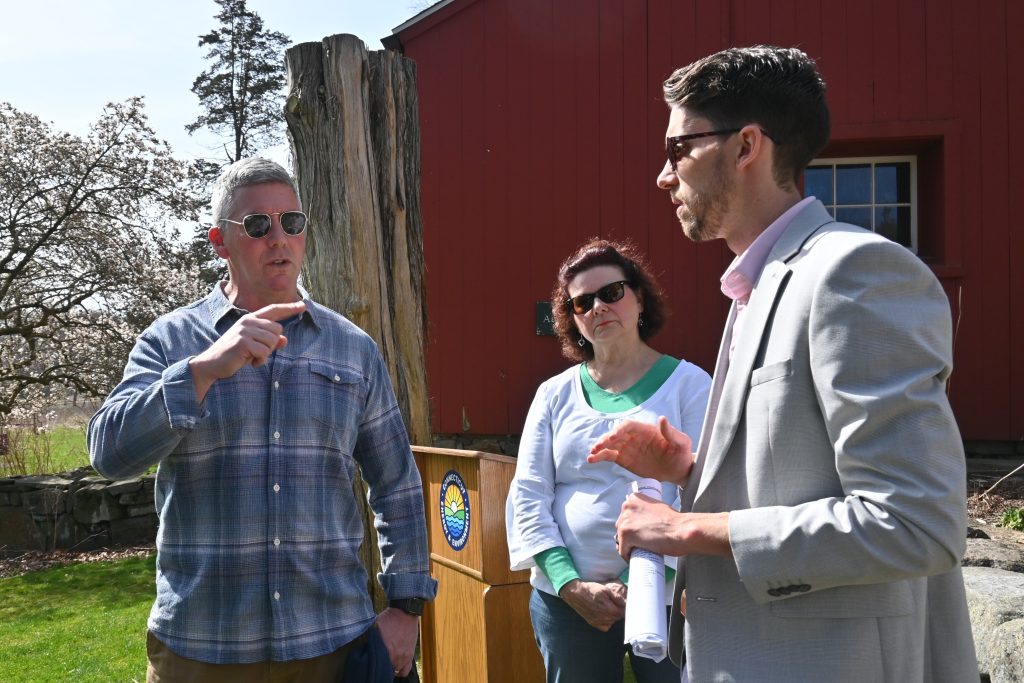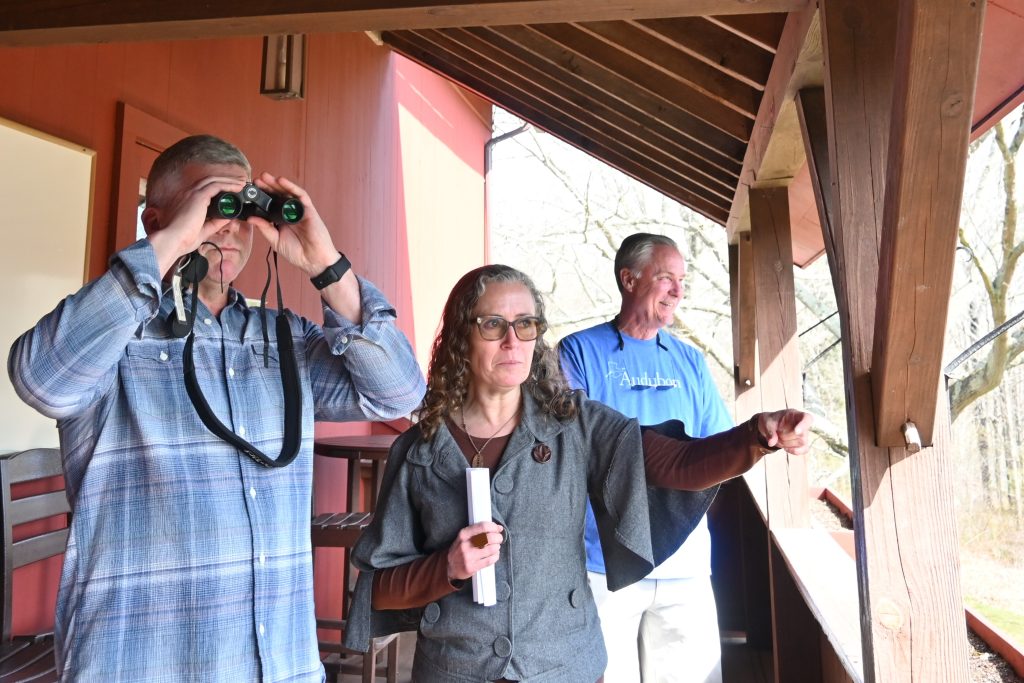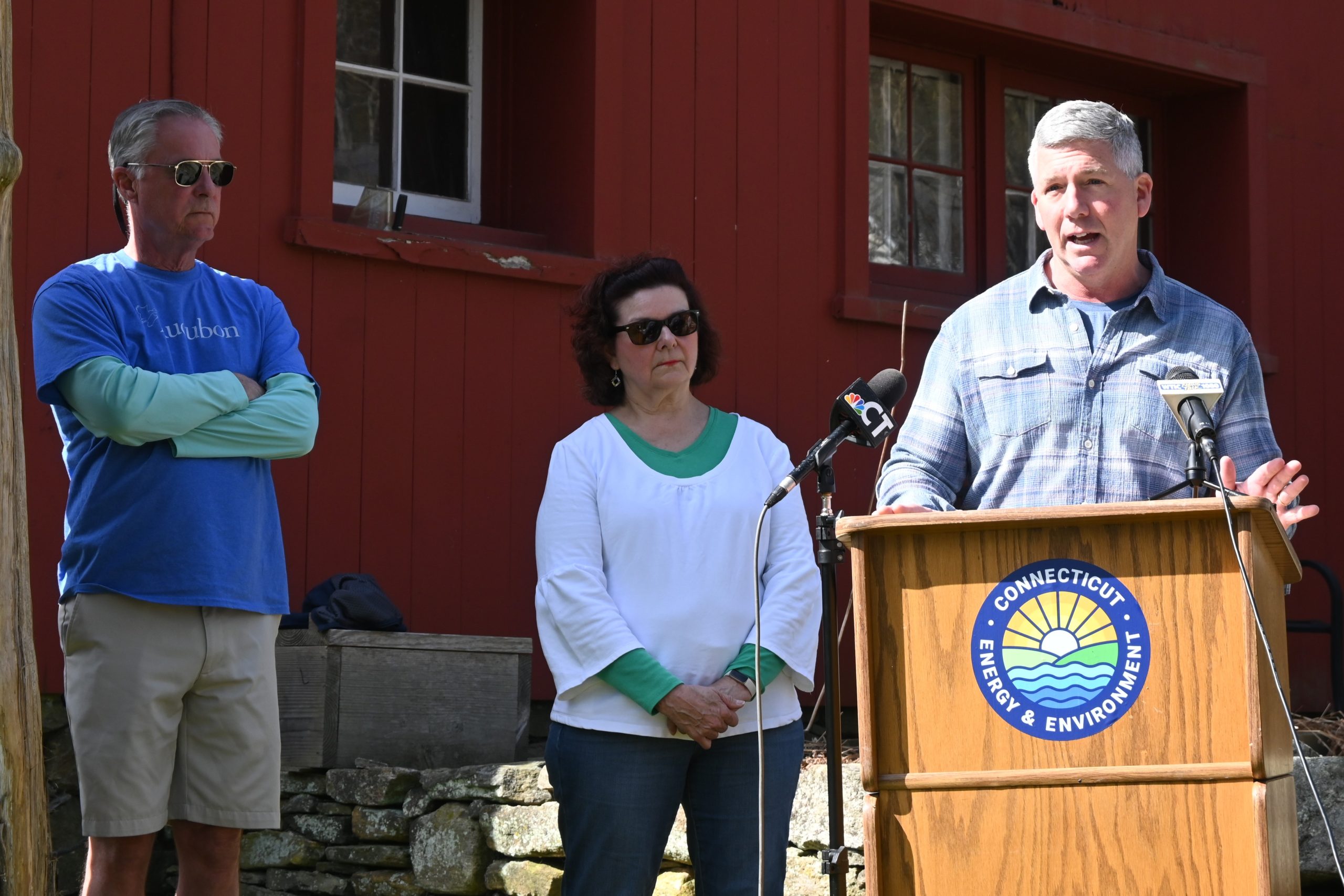Residents Reminded to Discourage Bears’ Bad Behaviors and Be Bear Aware
As much as we’d all like to have a friend like Paddington Bear, State Representatives Cindy Harrison (R-69) and Pat Callahan (R-108) yesterday joined members of the National Audubon Society and Department of Energy and Environmental Protection (DEEP) in Southbury to remind Connecticut residents to remove birdfeeders to eliminate one source of human-bear interactions.
With black bears emerging from their dens with the warmer spring temperatures, DEEP says it’s important we all do our part to reduce behaviors that result in human-bear conflicts. Simple steps like taking down birdfeeders and securing garbage can make a major impact. DEEP notes that “birdfeeders are an easy and tasty source of calories for bears, which regularly bring bears close to homes and condition bears to be comfortable in residential neighborhoods.”
“We’ve been banging the drum about the best way to keep bears out of our homes. We’ve all seen the social media posts about it. I saw a post this morning with a bear on a deck in my town and the caption was ‘I forgot to take the birdfeeder down.’ I think the message is getting out about what to do not to habituate bears by unintentionally feeding them,” Rep. Patrick Callahan, Ranking Member of the Environment Committee, said.

“I want to thank the Audubon Society and DEEP for continuing to remind the public about this important issue and for working to keep both residents and wildlife safe,” Rep. Cindy Harrison said. “In this case, a little common sense goes a long way. Take down your birdfeeders and significantly reduce the potential for dangerous human-bear interactions. At the same time, the ecosystem will thrive. The birds will seek food, namely insects, which helps keep the insect population in check. ”
During the 2023 legislative session, Reps. Callahan and Harrison supported Public Act 23-77 to ban the intentional feeding of potentially dangerous wildlife like black bears.
DEEP reports that it’s important to discourage bears from seeking out human-associated foods (e.g., birdseed, trash, pet food) to prevent them from becoming habituated and food-conditioned. “Food-conditioned bears pose a greater risk to public safety and often cause more property damage to houses, cars, pets, and livestock than non-food-conditioned bears.”
Tips and Statistics from DEEP
According to DEEP, Connecticut is the nation’s 14th most forested state, but is also the fourth-most densely populated with bear sightings having been reported in ALL 169 cities and towns. In 2023, bears entered people’s homes 35 times.
DEEP has several best practices for residents to follow to reduce the likelihood of an encounter with a bear, available on DEEP’s “Living with Black Bears” webpage, https://portal.ct.gov/DEEP-Living-with-Black-Bears.
Make Your Place a No-Bear-Food-Zone
Everyone can be a good neighbor and take steps to reduce encounters and potential conflicts with bears. The most important step is to remove food attractants, such as bird seed and unsecured garbage:
- NEVER feed bears.
- Take down, clean, and put away bird feeders by mid-March, or even earlier during mild weather. Store the feeders until late fall and clean up spilled seed from the ground. Store any unused bird seed and suet in a location not accessible to bears, such as a closed garage. Do not store bird seed in screened porches or sheds where bears will be able to rip screens or break through windows to access the seed.
- Store garbage in secure, airtight containers inside a garage or other enclosed storage area. Adding ammonia to trash refuse before tying the bag and then on top of the bag inside the can will reduce odors that attract bears. Periodically clean garbage cans with ammonia to reduce residual odor. Put garbage for pickup outside the morning of collection and not the night before.
- Do not store recyclables in a porch or screened sunroom as bears can smell these items and will rip screens to get at them.
- Keep barbecue grills clean. Store grills inside a garage or shed.
- Supervise dogs at all times when outside. Keep dogs on a short leash when walking and hiking. A roaming dog might be perceived as a threat to a bear or its cubs. (Dogs are required to be on a leash when visiting State Parks, State Forests, and Wildlife Management Areas. Check dog and check leash regulations for town properties, land trusts, and other public properties before heading to those areas.)
- Do not leave pet food outdoors or feed pets outside.
- Use electric fencing to protect chickens, other livestock, beehives, agricultural crops, and berry bushes. Find information about installing electric fencing at https://portal.ct.gov/-/media/DEEP/wildlife/pdf_files/outreach/CT-BearWise-Bulletin-3-Electric-Fencing.pdf.
- Avoid placing meat scraps or sweet foods, such as fruit and fruit peels, in compost piles.

Report Bear Sightings
Bear sightings reported by the public provide valuable information to assist DEEP in monitoring changes in the black bear population. Anyone who observes a black bear in Connecticut is encouraged to report the sighting on DEEP’s website at https://portal.ct.gov/DEEP/Wildlife/Report-a-Wildlife-Sighting or send an email to deep.wildlife@ct.gov. Information on the presence or absence of ear tags, including tag color and numbers, is particularly valuable.
More Information
To learn more about Connecticut’s black bear population, read the current Bear Report here: 2024 The State of the Bears (ct.gov). A portion of this press release was provided by BearWise®, a program created by bear biologists, and supported by State Wildlife Agencies.


